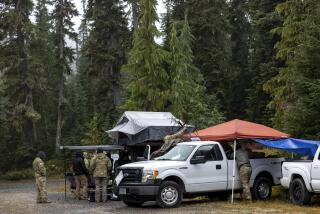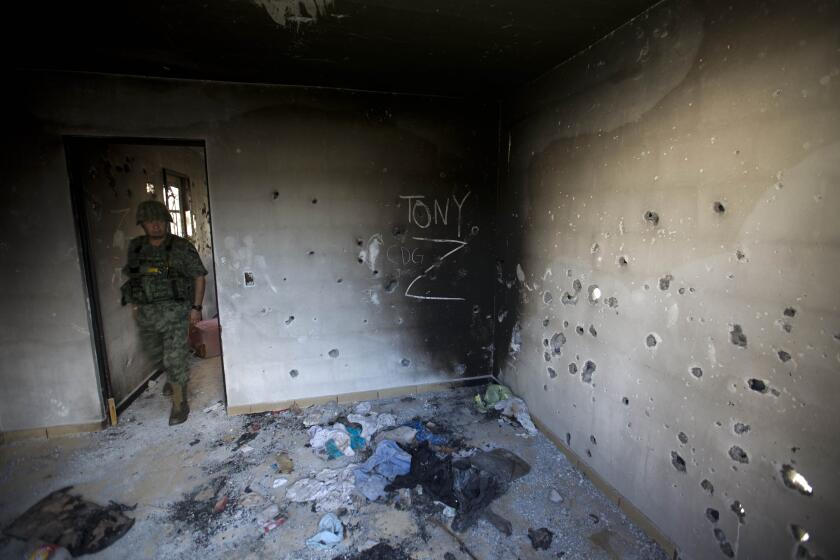Final Flight : Pentagon Cuts Put Norton’s 53rd Squadron Out of Business After 51 Years
SAN BERNARDINO — Mention Air Force and the images are conjured: feisty fighters, brawny bombers. Stealth. Sleek and hot. Dogfights and artillery flak. F-14s and B1s. Bullets and bombs.
And so it could easily have gone unnoticed: The decidedly unsexy 53rd Airlift Squadron--crews who fly a bunch of old, lumbering, utilitarian cargo planes--is being retired today at Norton Air Force Base.
For the record:
12:00 a.m. May 1, 1993 For the Record
Los Angeles Times Saturday May 1, 1993 Home Edition Part A Page 2 Column 3 National Desk 1 inches; 26 words Type of Material: Correction
Air Force--In a story Friday about the retirement of the Air Force’s 53rd Airlift Squadron, an incorrect reference was made to an Air Force plane. In fact, the F-14 is a Navy fighter jet.
The squadron is the latest to be disbanded at Norton, pegged in 1988 in the first of three rounds of base closures. The last of the camouflaged C-141s will lift off from Norton this summer.
It may seem little more than an entry into the logbook, a bureaucratic swipe in the bigger scheme of things: The Blackjacks, as the thousands of men and women who have served the 53rd call themselves, are folding their hand after 51 years.
Lt. Col. Skip Mills, the squadron’s 44-year-old commander, has locked the door to the squad room. “You wouldn’t believe how difficult that was,” he said Thursday after running through a rehearsal for today’s final ceremony. “This has been family, and now the family is leaving. It’s hard.”
Mills and others reflected on the 53rd’s past.
Dropping paratroopers out of C-47s over Sicily in 1942 and delivering 8,500 gallons of gasoline to Gen. George Patton’s troops near Frankfurt. Flying soldiers and supplies into Korea, and the wounded out. Delivering ammo to Da Nang, troops into Panama and Patriot missiles to Tel Aviv.
There have been the humanitarian flights and rescues too. The Berlin airlift. The return of POWs from Hanoi and bodies from Jonestown. Pulling college students off the island of Grenada. Delivering disaster relief to Bangladesh, 40,000 pounds of vegetable seeds to Zaire, earthquake supplies to Central America, life support to Somalia and food to starving Siberians.
And there were domestic missions: carrying relief supplies to hurricane-battered Florida, aid to blizzard-stricken New England, emergency cleanup equipment to Three Mile Island and hay to starving cattle in Kansas.
Not exactly “Top Gun” stuff, and the crews of today’s C-141s--bigger than a 707, smaller than a 747--take their hits: “Hey you, trash hauler!” “Hey you, heavy driver!”
“The more glamorous missions belong to the shooters who drop the bombs and shoot the guns,” said Col. John D. Hopper Jr., commander of the 63rd Airlift Wing and the boss at Norton.
“On the other hand, we like to point out that we in Air Mobility Command are the only command that does its mission day in, day out. We’re flying virtually all the time.
“If you look at TV and see an air crew, chances are it will be one of ours.”
What kind of pilot wants to captain a C-141? Someone who likes to command a crew of five or more: a co-pilot, engineers and load masters. Or pull up from the deck and drop materials or paratroopers at 800 feet. Or be the first Americans to land on a rough foreign runway and find themselves thrust into the role of American ambassadors. Or refuel in air at 400 m.p.h. after coaxing the aircraft to within 25 feet of an air tanker as the jet wash wiggles the vertical stabilizer.
This is about as technical, as hairy, as any kind of flying, said Capt. Scott Chesnut of the 53rd.
“I had my choice of aircraft, and I chose this,” he said.
Andrew E. McDavid was the squadron’s commander from 1949 to 1952. He is 78 now, living in Phoenix, and still keeps in touch with his boys.
“We were the best,” he said. “We outdid everybody in most everything. We flew the most tonnage, the most hours, the most airplanes.”
The 53rd had been inactivated twice before, only to return to action. No one is betting on its future this time; the scrapbooks, the logbooks, the flag will all be carefully stored after today’s ceremony, and the few members of the squad still around will say their goodbys and head to new assignments.
“This has certainly been the highlight of my career, commanding the 53rd,” Mills said Thursday. “To lose this is a disappointment.
“But in the military, no job is permanent.”
More to Read
Sign up for Essential California
The most important California stories and recommendations in your inbox every morning.
You may occasionally receive promotional content from the Los Angeles Times.










